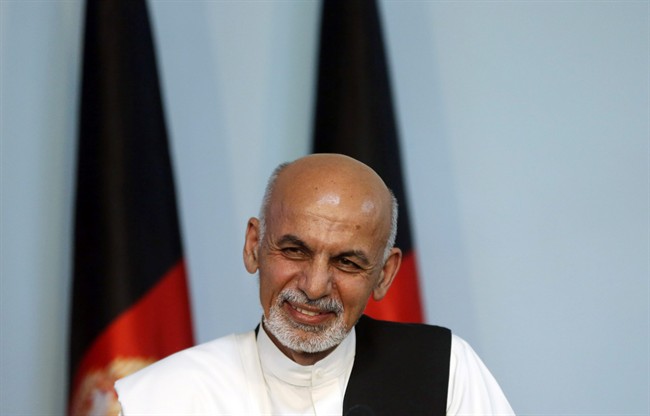BEIJING – Afghanistan’s new president invited the Taliban to join in a peace process backed by the international community on Friday, an unusual direct reference to the insurgents who have stepped up attacks in an attempt to bring down his month-old government.

Speaking at a conference on Afghan peace and reconstruction in Beijing, Ashraf Ghani Ahmadzai made no specific proposals and indicated government forces wouldn’t back away from the fight. However, his mention of the Taliban by name marked a departure from his usual public references to them as “political opponents.”
“Peace is our highest priority. We invite the political opposition, particularly the Taliban, to join and enter Afghan dialogue, and ask all of our international partners to support an Afghan-led and Afghan-owned peace process,” Ghani Ahmadzai said.
He added: “We must not and will not permit groups pursuing grand illusions to use our country as the battleground or launching-pad against the international system.”
It wasn’t immediately clear if there was any particular significance to Ghani Ahmadzai referring to the Taliban by name, beyond the fact he was speaking to an international audience on his first state visit abroad.

Get breaking National news
Ghani Ahmadzai’s attitude toward the Taliban has been a departure from that of his predecessor, Hamid Karzai, who habitually referred to the insurgents as his “brothers” and castigated the United States for its military presence in Afghanistan.
In response, the Taliban have intensified suicide bombing, roadside bombs and rocket attacks on the Afghan capital to give the impression that Ghani Ahmadzai’s government can’t protect the capital.
In his address to the gathering, Chinese Premier Li Keqiang said China has faith in Afghanistan’s ability to solve its own problems, but that its neighbours should help create a peaceful environment without interfering in its internal affairs.
“The International community should respect Afghanistan’s sovereignty, independence and territorial integrity, not interfere with its internal affairs and support Afghanistan’s efforts to realize security and stability,” Li said.
China’s hosting of the annual conference highlights its growing role in Afghanistan as most U.S. and international troops prepare to leave by the end of the year.
China said Wednesday it would provide $330 million in grants to Afghanistan along with professional training and scholarships for 3,500 Afghans over the next five years.
Beijing is keen to help develop Afghanistan’s estimated $3 trillion in mineral wealth and wants a strong, stable government in Kabul. It is concerned that unrest could spill over into its restive northwestern region of Xinjiang, where radicals among the native Uighur population have launched a series of attacks in recent months.
China said earlier it had received a pledge from Ghani Ahmadzai to help combat a radical anti-China group known as the East Turkistan Islamic Movement, which it blames for masterminding attacks in Xinjiang and elsewhere. It’s unclear, however, whether the organization has a presence in Afghanistan.
While China and the U.S. are rivals for influence in the Asia-Pacific, Washington has welcomed Beijing’s increased involvement in Afghanistan.
Since 2009, the two have seen a growing convergence of views and the U.S. now regards China as a “critical player” in the Afghan region, according to a senior State Department official who spoke to reporters on routine condition of anonymity.
“The U.S. sees Afghanistan as an area of real co-operation with China and not one of competition,” said the official.
The U.S. and China have begun jointly training Afghan diplomats, the official said. The U.S. also hopes China will use its good relations with Pakistan to convince Islamabad to crack down on elements accused of supporting Afghan insurgents, he said.









Comments